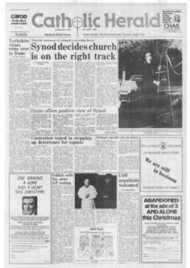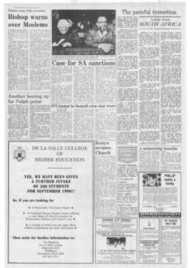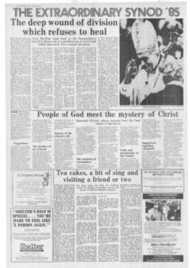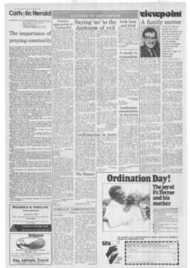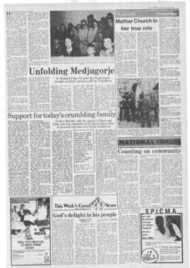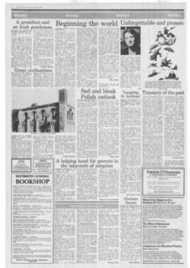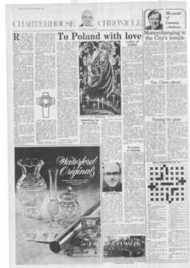Page 2, 13th December 1985
Page 2

Report an error
Noticed an error on this page?If you've noticed an error in this article please click here to report it.
Tags
Share
Related articles
Hurley Looks To Future Post Inkatha-gate
South African Bishop Is Accused On Marxist Control
S.a. Bishops Oppose White Rule
Papal Envoy Looks At Sa Reforms
South African Bishops Challenge Apartheid
The painful transition
Letter from
SOUTH AFRICA
by Carmel Rickard
FOR ARCHBISHOP Denis Hurley, one of his greatest disappointments is how slowly and with what difficulty people change. Interviewed on the occasion of his seventieth birthday, he said it had taken him many years to discover this.
"People grow up in a certain atmosphere where attitudes have been established ... new values, new attitudes are very very difficult to accept. And if it's difficult for one person, it is almost impossible for a society.
"That is how I see the white population of South Africa. The sort of consolidated, fossilised strength of social attitudes is my greatest disappointment. As a priest, instinctively I appeal to conscience. But in matters of social life and politics it is not conscience that counts. It is power."
But he still urges this change, calling on white people to come to terms with the pain of "letting go." It is a change which he himself has had to undergo, and he speaks to whites from his own experience. He first became "politically aware" as a -young priest' studying in Rome.
"I'd grown up in South Africa entirely accepting the social attitudes of the whites, and never thought of any injustices. In fact I can remember as a young teenager, resenting Mahatma Gandhi whom I later came to look upon as one of my greatest heroes for upsetting the British empire and rocking the boat."
There he discovered the church's social teaching and was greatly influenced by Josef Cardijn, founder of the Young Christian Workers. When he returned to South Africa in 1940 what he learned in theory had to be applied in South Africa, particularly to race relations.
Today, as Archbishop of Durban, a mainly black archdiocese, he is viewed as something of a boat rocker himself by most South African whites, although he does not fel he had totally eradicated all the influences of his youth.
"I don't think my 'political conversion' was sudden or deeply painful. It was more a conversion in the head, stemming from my theological studies. But there have been times when I have been struck by being a member of the white group and not being able to shake off entirely all the influences of the past.
"I remember once, preparing a speech for some conference in Germany, and there sitting in this hotel and thinking about what I was going to say, it suddenly hit me so hard that I was a member of an oppressive, oppressing race. I was quite devastated by it." Speaking of the future of South Africa, Archbishop Hurley says that it is only his Christian faith which gives him any hope. He dismisses the view of exerting so much pressure on South Africa that resistance could end within a couple of years and be followed by change.
"I think it will he a much longer, more difficult, painful struggle. I can't see the whiles yielding easily: especially held together by powerful resolution. They will endure enormous suffering and privation to maintain their position.
"But there is no stopping now what is happening in the black population. It has to end with the majority taking over: there can be no other outcome.
"With Christian hope one prays, and tries to influence what is happening in the direction of truth, freedom and full participation, in the direction of justice and final acceptance, and reconciliation and the building up of a single country, involving all our people.
"But that is more in the light of Christian hope than any immediate human hope."
Archbishop Hurley was a member of the Central Preparatory Commission of the second Vatican Council and he says the new vision of the Church as developed by the Council has become a major influence in his life.
"That Council was something that happens to few people, and it happened to me: to be a memher of the Council, to participate in it and to see the evolution and growth of our Catholic theology, the expansion and deepening of our understanding of the Church and above all the revelation of a completely new attitude by the Church to the world — so that the Church must love the world, must be involved in the world, and the Church is for the world — the Church is here to enlighten, to evangelise and to sanctify the world. That vision is, I think, the inspiration of my life.
Ile is often under fire for "bringing politics into religion" but he refers to one of the Council documents to explain that, contrary to what his critics might think, the Church must be involved in political issues.
"This document (The Constitution of the Church in
the Modern World — Gaudium et spes), represents to me, the greatest transformation in iChristian thinking that has ever occurred in nineteen hundred years.
"(It) has a lot to say about politics and justice and the Church's role of animating and permeating, humanising and Christianising human society. And when you Christianise and humanise society you go into all its aspects — social, political, cultural, economic.
"In fact when we talk about evangelisation now — the Church's work In the world we talk about evangelising and Christianising culture, human culture. Not by imposing upon it, but by trying to work from within as a leaven in the mass
"That of course leads anybody who understands the doctrine to be totally dedicated to the pursuit of justice in society and that I think is why some years after the Council the Catholic Church in South Africa began to involve itself in this great adventure of trying to bring the values of the kingdom, of truth, justice, freedom, love, compassion, into human society."
The Archbishop speaks warmly of the memories he calls the happiest of his life — the 'first fervour' of his early days in the novitiate in Ireland, his ordination and the months after that — "A kind of honeymoon Gwiotdh thanedrelsigplioriutos allifevaililuews sohich dominate your whole experience that you want to write to all your friends and say, 'Come and join me'. You get a kind of charismatic enthusiasm for what you have embarked upon."
But a highlight of his priesthood was converting and praying with a dying black convict in 1941.
With the help of a Catholic prisoner, he baptised and prayed with the sick man. When he returned the next day to bring communion to him, he heard a story from t h e interpreter/prisoner. During the night the dying man had called out, "Did you see that man come in? All dressed in white, glowing brightly? He said, 'I'm coming for you tomorrow'."
The Archbishop continues, "Soon afterwards, the man died: I didn't bury him. I suppose a member of his previous church did that. I never saw him again, but I think 1 have a very powerful friend in heaven."
blog comments powered by Disqus


